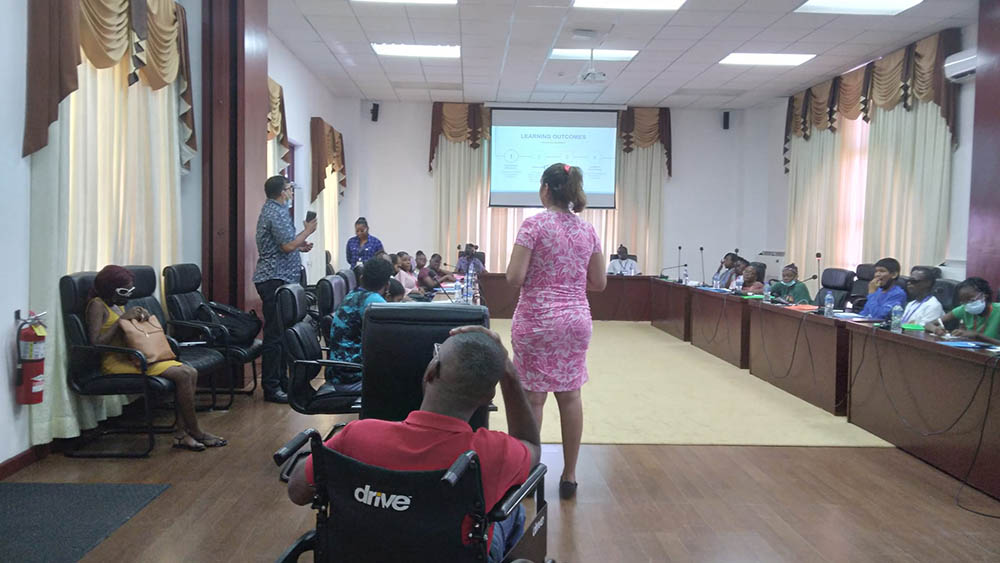Youths with disabilities in Guyana are advocating for changes to several Acts that will improve their quality of life and create more opportunities for them to make meaningful contributions to society.
These issues were raised at the recently concluded inaugural National Youth with Disabilities Conference which was held at the Arthur Chung Conference Centre on December 2 and 3.
According to a release yesterday from the Guyana Council of Organisations for Persons with Disabilities (GCOPD), this conference was implemented in partnership with the International Foundation for Electoral Systems (IFES) with support from the United States Agency for International Development (USAID). It said that approximately sixty youths with disabilities from across Guyana were in attendance and were engaged in discussions relating to the current status of disability in Guyana and the required improvements to “positively change the status quo of disability in Guyana.”
The release also noted that GCOPD is the umbrella body that represents the majority of Disabled People’s Organisations (DPOs) from across Guyana, working in the areas of advocacy and capacity building. These DPOs represent disabilities of all types.
The declaration covered three major areas.
Leadership and Governance
• Persons with Disabilities who possess the necessary qualifications should be encouraged to be a part of the legislative, judicial, and executive arms of government, and any barriers that hinder this process should be removed;
• The Local Authority (Elections) Act, Chapter 28:03, should be amended to remove Section 40 (2) that bars persons with disabilities who receive public assistance, from running for local government office;
• The relevant legislation should be amended to promote independent accessible voting for persons with disabilities and all administrative measures implemented by the Guyana Elections Commission (GECOM) to promote accessible and inclusive voting for persons with disabilities;
• Youths with disabilities should be represented on the President’s Youth Advisory Council and all other similar bodies and be meaningfully engaged by the Ministry of Culture, Youth and Sport;
• All government ministries and agencies should have disability inclusion policies to guide the delivery of service and accommodation of persons with disabilities.
Employment
The Guyana Persons With Disabilities Act should be amended to:
• Increase the penalties for employers who discriminate against employees with disabilities and strengthen the reporting mechanism for cases of discrimination;
• Exempt persons with disabilities from paying PAYE or income tax if their income is below $2,400,000 per year;
• Encourage the private sector to employ qualified and skilled persons with disabilities through the granting of tax concessions and other special concessions;
• There should be mandatory disability sensitivity training sessions for employers and staff on disability rights, non-discrimination, and reasonable accommodations for persons with disabilities;
• Ensure that all government agencies budget to provide reasonable accommodations for employees with disabilities;
• Allow for government ministries and agencies to have a minimum of 5 per cent of staff as employees with disabilities if they employ more than 20 persons;
• There should be special job fairs targeting persons with disabilities;
Accessibility
• The relevant legislation and policies should be amended and strengthened to ensure that all public buildings are fully accessible for all persons with disabilities, with strict enforcement and timelines for implementation. This should include ramps, elevators, wide doorways, corridors, accessible washrooms;
• The built environment inclusive of sidewalks, roadways, should be modified or made accessible in compliance with the Universal Design to ensure full accessibility and independence of persons with disabilities;
• Traffic signals, pedestrian crossings and other similar systems should be retrofitted or made accessible to accommodate persons with disabilities;
• There should be a special accessible transportation service to transport persons with disabilities at a subsidised cost in the absence of a structured public transportation provider or system;
• All information for public dissemination should be accessible for persons who are deaf, persons who are blind and persons with learning disabilities. Additionally, all websites should be accessible in compliance with the international guidelines;
• All textbooks and other materials should be available in an accessible alternative format to accommodate persons with disabilities. This includes braille and audio books, sign language and close-captioned videos.





